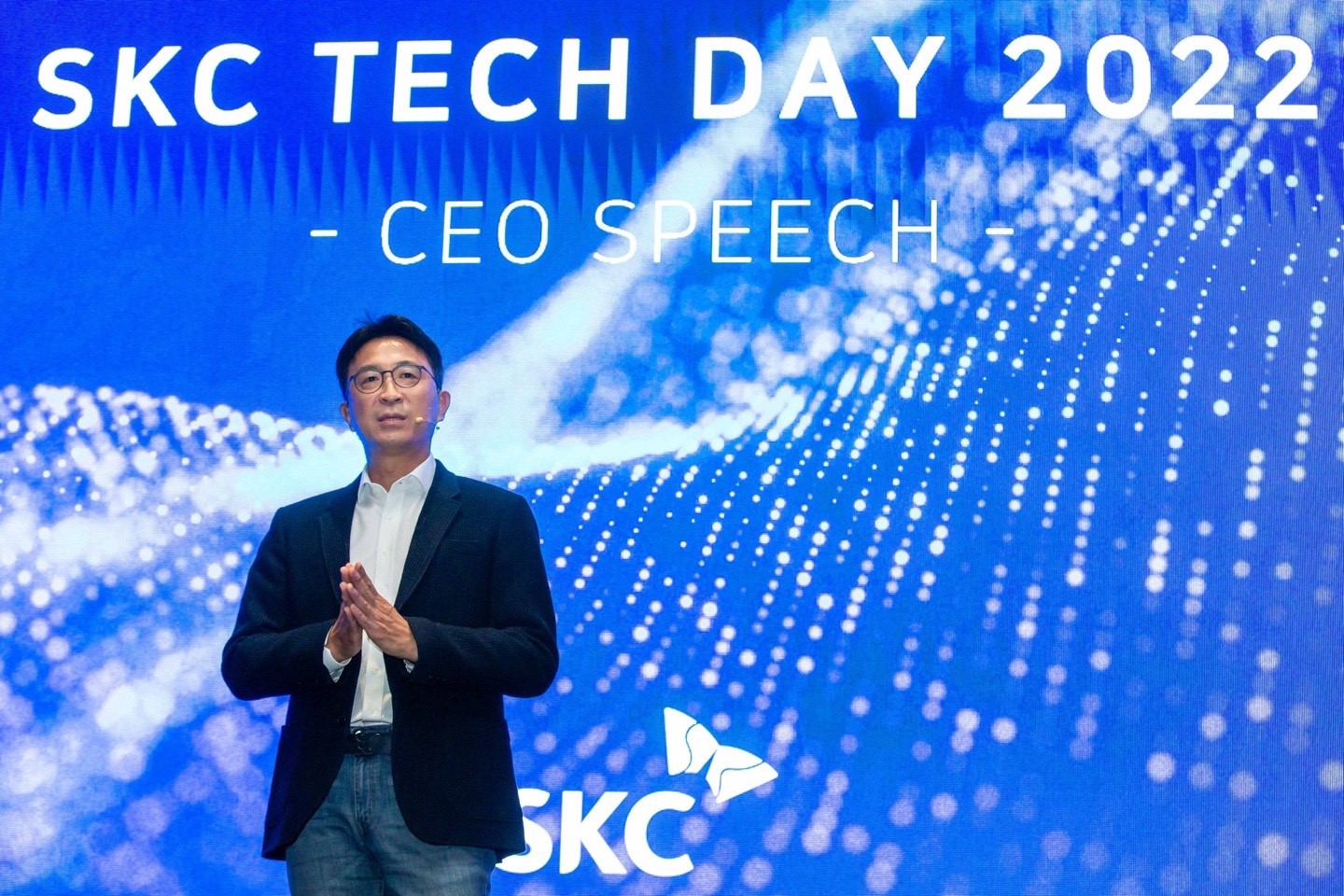● SKC held SKC Tech Day 2022 at Seoul Walkerhill Hotel on November 23 to share its future technology roadmap and new business progress.
● Many super-gap and eco-friendly technologies were disclosed including AI-_ base_d optimization of copper foil properties and fiber manufacturing technology using biodegradable materials.
● CEO & President Woncheol Park said in a keynote address, “We will ensure technological superiority above other p_ layer_s to provide differentiated products and solutions.”
SKC (CEO & President Woncheol Park) held SKC Tech Day 2022 at Seoul Walkerhill Hotel on November 23 and unveiled a blueprint for future business technologies. SKC Tech Day is an event of introducing and sharing SKC’s technology roadmap and commercialization progress with the guests including analysts and institutional investors.
CEO & President Woncheol Park of SKC said, “SKC will provide optimized products and solutions to its clients through global expansion and technological superiority above other p_ layer_s in the fields of rechargeable battery, semiconductors, and eco-friendly materials.” He continued to share the company’s business model innovation process by adding relevant technologies through M&A, R&D, and collaboration with its original technologies and also shared future expansion plans.
The overwhelming, top-of-the-world technology of SKC’s copper foil business was made possible by the know-how from its existing film manufacturing and the synergy of copper foil manufacturing technology made available through the acquisition of SK nexilis. A similar approach was applied to the CMP pad business. CMP pad is a major material for front-end semiconductor processes and SKC solmics is taking the lead in the localization of CMP pads by adding related technologies through in-house R&D efforts _ base_d on an existing polyurethane synthesis technology. SKC will further expand its key technologies through intensive M&As and continuous R&D activities.
At the SKC Tech Day, presentations were made by each business division and invested companies following the keynote address. SKC’s technologies introduced on the day covered its future core businesses including rechargeable batteries (copper foil, silicon anode material), semiconductors (glass substrate, CMP pad, blank mask), and eco-friendly materials (PBAT, PG, polyurethane).
In the field of rechargeable battery materials, plans to strengthen technological capabilities for copper foil and silicon anode material were released. To maintain the superiority of its copper foil manufacturing technology above other p_ layer_s, SK nexilis will be the first in the global copper foil industry to use artificial intelligence (AI) and match the material properties with customer demand. In addition, the company is gearing up to supply products promptly according to future demand by forecasting and developing products with certain specifications and properties that are expected to be demanded by clients. The company also has nickel foil mass production technology that can be used to respond to the spread of all-solid-state batteries.
SKC plans to start construction of a manufacturing facility for silicon anode material, a key material for future rechargeable batteries next year and begin full-scale commercialization. In particular, SKC invested in Nexeon, a British tech company, and was given exclusive business rights for a new technology that combines the advantages of various methods. Accordingly, the company has gained market competitiveness by drastically lowering the level of difficulty and price of processing.
In the field of semiconductor materials, a technology roadmap was introduced to the audience featuring glass substrates, CMP pads, and blank masks. Absolics Inc. has recently started constructing a manufacturing facility in the U.S. and made all the preparations for mass production as it standardized more than 200 special processes for _ _ embed__ding passive elements such as a mult_ i_ layer__ ceramic condenser (MLCC) on a substrate. SK solmics, which is seeking to expand its share in the markets of CMP pads and blank masks that had been dominated by foreign companies so far, announced next-generation technologies of product life extension and process error reduction that can further improve the productivity of its clients.
Unveiled technologies in the field of eco-friendly materials involved the enhancement of eco-friendly features and advantages of existing businesses. For PU production, SK picglobal is using PO produced by the eco-friendly HPPO method which was commercialized for the first time in the world in 2008. Furthermore, the company plans to use recycled oil generated from waste plastic pyrolysis and introduce wastewater recycling technology _ base_d on carbon dioxide capture technology and membrane (thin film) technology.
SK pucore revealed that it is working on the development of a new, biomass-_ base_d polyol following the repolyol technology that turns discarded polyurethane into its _ base_ material, polyol. SKC also disclosed a technology that spins the use of PBAT, a biodegradable plastic material, beyond the existing containers and plastic bags into highly elastic fibers.
CEO & President Woncheol Park said, “We will pursue sustainable growth through daring portfolio changes and expand R&D capabilities for materials and solutions to continuously develop future businesses and secure technological superiority with an overwhelming gap,” and emphasized, “We will orient all these business activities to move forward as a global ESG materials solution company, execution _ base_d on ESG.” [End of _ document_]

